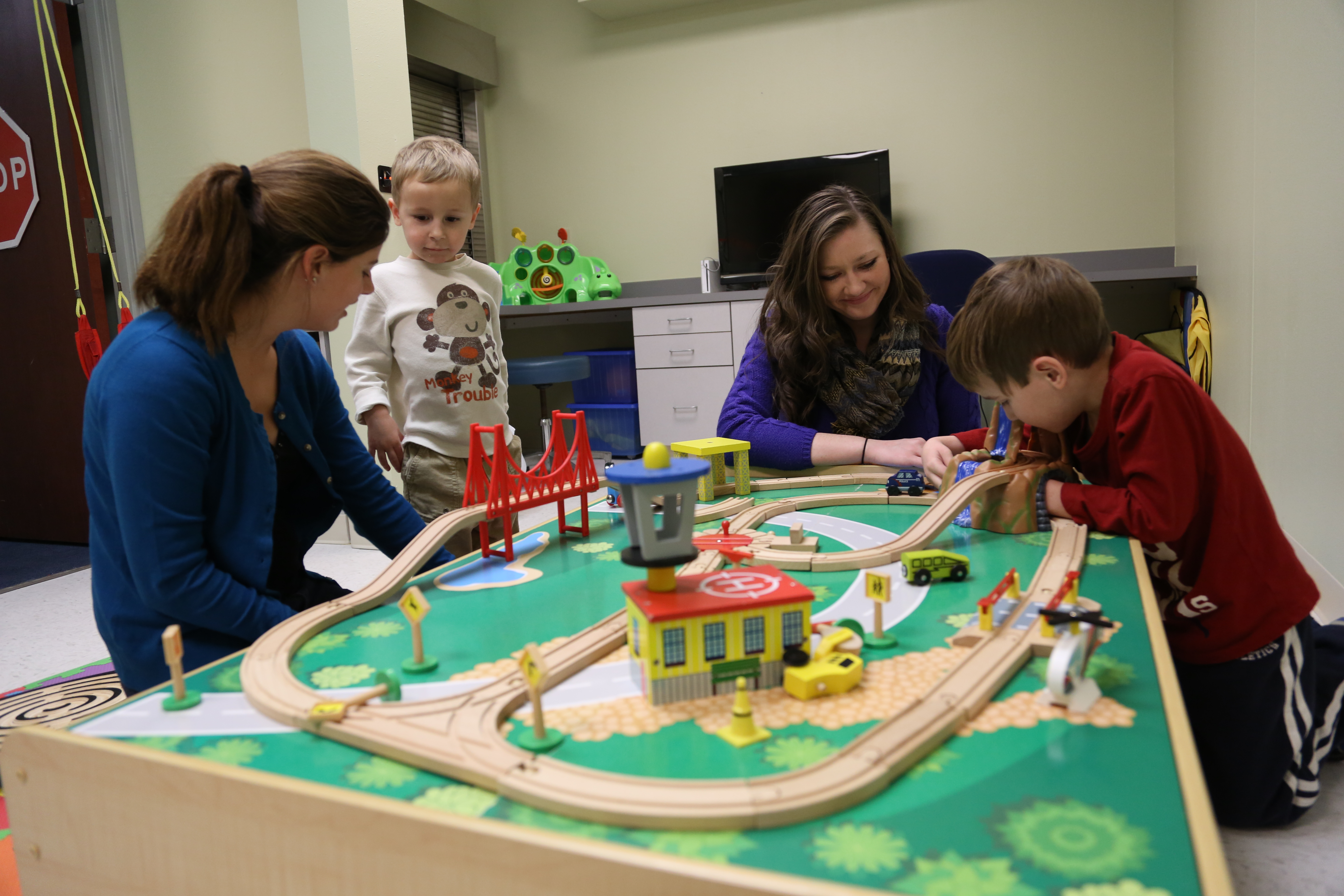Baylor University and McLane Children’s Scott & White Partner to Open Center for Developmental Disabilities

Sarah Turchan and Ashley Wyatt conduct therapy sessions at the Baylor Center for Developmental Disabilities. (Baylor University)
Follow us on Twitter:@BaylorUMediaCom
Contact: Tonya B. Lewis, (254) 710-4656
Media Advisory
WACO, Texas (March 31, 2014) – Baylor University and McLane Children’s Scott & White will host an open house ceremony and tour to launch the Baylor University Center for Developmental Disabilities (BCDD) from 2 to 3 p.m., Tuesday, April 1, at Hillcrest MacArthur Center, 2201 MacArthur Drive, Waco, Texas. The ceremony coincides with the first day of National Autism Awareness Month.
WHAT: Open House Ceremony and Tour for the Baylor University Center for Developmental Disabilities
WHEN:2 to 3 p.m., Tuesday, April 1
WHERE: Hillcrest MacArthur Center, 2201 MacArthur Drive, Waco, 76708
WHY: To announce and celebrate the Baylor University and McLane Children’s Scott & White collaboration that led to the development of the Baylor University Center for Developmental Disabilities
WHO: The ceremony will include brief remarks from:
• Baylor President and Chancellor Ken Starr
• Drayton McLane Jr., chair of the board of trustees for Scott & White Healthcare
• John Boyd III, M.D., Chief Executive Officer and Chief Medical Officer, McLane Children’s Scott & White
The BCDD combines the support of a major healthcare system with a university’s educational and health services and programs to serve children with development disabilities and their families in Waco and the Central Texas region. The Center combines service providers in one central location in an effort to synchronize services and provide better coordination and communication for children and families.
“The opening of the Center marks three years of development and support emanating in part from the passion of Dr. Alma Golden of Scott & White and Baylor University’s First Lady Alice Starr, ” said Jon Engelhardt, Ph.D., dean of Baylor’s School of Education. “This project was motivated by the goal of providing coordinated health and educational services for children with developmental and behavioral disabilities and their families. One of its main purposes is to help parents have easy access to relevant services without having to discover where such services are located, among a myriad of agencies and locations spread across the community.”
The Center concentrates on addressing complex issues of children with developmental disabilities, such as Autism Spectrum Disorders (ASD), through its cooperative research, educational, and service programs. The Center also serves as a training venue for Baylor students preparing for related professional careers, who also provide services for the children.
The Center currently is composed of three clinics within two divisions: The Behavioral and Educational Services Division contain the Baylor Autism Resource Clinic (BARC) and the Clinic for Assessment, Research, and Education (CARE), while the Speech Language Pathology Division houses the Speech and Language Clinic. BARC services include various disability assessments, social skills groups, autism summer day camp, resource and material library, special education consultation and advocacy services. CARE provides functional behavior evaluations, behavioral therapy, parent and educational consultation, and educational assessments.
The Speech and Language Clinic mirrors the services it provides on the Baylor University campus by providing comprehensive evaluation and treatment for patients of all ages with difficulties in communication processes or swallowing. The range of services includes: screenings, consultation regarding communication delays and disorders, comprehensive evaluations and treatment for speech language, and hearing habilitation and rehabilitation.
The BCDD intends to provide opportunities for interdisciplinary research by combining expertise in medicine, education, psychology, speech and language, among other disciplines.
“We are excited about the collaboration between the Baylor University Center for Developmental Disabilities and McLane Children’s Scott & White,” said Eric L. Robinson, Ph.D., director of the BCDD and associate professor of educational psychology in Baylor’s School of Education. “The ability to combine high quality and multidisciplinary services for children with developmental needs, offer advanced training opportunities for students, and collaborate on research projects will make the Center a unique and valuable resource for central Texas and beyond.”
A tour of the Center will take place immediately following the ceremony.
ABOUT BAYLOR UNIVERSITY
Baylor University is a private Christian University and a nationally ranked research institution, characterized as having “high research activity” by the Carnegie Foundation for the Advancement of Teaching. The University provides a vibrant campus community for approximately 15,000 students by blending interdisciplinary research with an international reputation for educational excellence and a faculty commitment to teaching and scholarship. Chartered in 1845 by the Republic of Texas through the efforts of Baptist pioneers, Baylor is the oldest continually operating University in Texas. Located in Waco, Baylor welcomes students from all 50 states and more than 80 countries to study a broad range of degrees among its 11 nationally recognized academic divisions. Baylor sponsors 19 varsity athletic teams and is a founding member of the Big 12 Conference.
ABOUT BAYLOR SCHOOL OF EDUCATION
Founded in 1919, the Baylor School of Education (SOE) prepares leaders through four departments in two broad program areas, Professional/Teacher Education and Health Education. Leadership preparation begins in undergraduate programs, continues through master’s level work, and culminates in both Ed.D. and Ph.D. programs. The SOE impacts the world as students participate in faculty-guided fieldwork, service learning, and community-focused research in local and global contexts. The school shapes the future by mentoring the whole person, developing an understanding of theory and practice, and encouraging responsiveness to one’s calling.